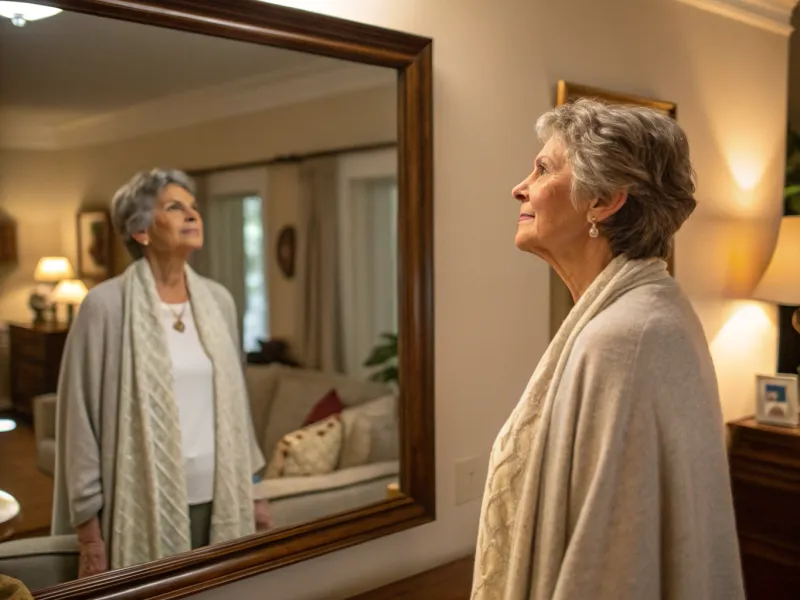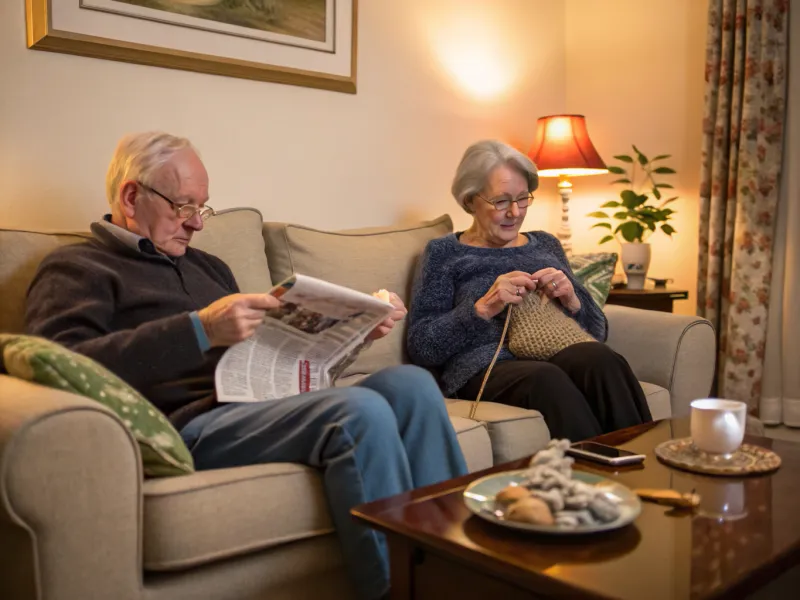27 motivi per cui le donne sopra i 60 anni abbandonano i matrimoni a lungo termine
In a world where long-term marriages are often viewed as an unbreakable commitment, it’s both eye-opening and courageous when women over 60 decide to leave.
This isn’t about abandoning ship but reclaiming one’s life after years of feeling invisible or undervalued. You may have stayed because it seemed like the right thing to do or because you believed things would get better. But now, you’re considering a path that prioritizes your well-being and happiness.
Ecco 30 motivi per cui le donne in questa fase della vita potrebbero scegliere di andarsene, offrendo spunti di riflessione e forse un senso di solidarietà per chi sta meditando la stessa scelta.
1. Sentirsi inascoltati e trascurati

Anni in cui ci si è sentiti inascoltati possono logorare. It’s not just about the conversations where your voice wasn’t acknowledged; it’s about the emotional disconnect that slowly builds a wall between you and your partner. Imagine sitting at a dinner table night after night with no eye contact, no real exchange beyond the mundane.
Ricordate i momenti in cui avete cercato di esprimere i vostri pensieri, le vostre preoccupazioni, i vostri sogni, per poi ricevere indifferenza o cambiare argomento. Nel corso del tempo, questo schema diventa un arazzo di negligenza, che si intreccia con gli anni fino a quando iniziate a sentirvi invisibili. Il silenzio diventa più forte di qualsiasi discussione, segnando l'assenza di un vero legame.
Choosing to walk away from such a relationship is not a step taken lightly. It’s a decision to seek a space where your voice echoes back, where your words matter. It’s an act of self-preservation, a defining moment when you decide that living in quiet desperation is no longer an option. You deserve to be seen and heard, and sometimes, that means stepping away.
2. Tradimenti finanziari

Financial betrayals cut deep and create an indelible breach of trust. Discovering hidden debts or secretive spending can shake the very foundation of a marriage. It’s not merely about the money, but the deception that accompanies it. When you’ve spent decades building a life together, the revelation of financial betrayal feels like a betrayal of the heart.
You ask yourself how many more secrets lie hidden beneath the surface, questioning the honesty of every financial decision made together. The security you thought you had evaporates, leaving a trail of doubt and resentment. You wonder if your partner truly understands the impact of their actions—not just on your bank account, but on your sense of partnership.
Walking away becomes a path to reclaiming your financial independence and peace of mind. It’s about taking control, ensuring that your future is not jeopardized by someone else’s choices. As daunting as it may seem, leaving behind the deceit allows you to pursue a life where transparency and trust are valued.
3. Trascuratezza emotiva

Emotional neglect is like an invisible chain, binding you with no visible scars. It’s not dramatic or loud; it’s the quiet withdrawal of affection and attention that leaves a hollow in your heart. Over time, the mancanza di supporto emotivo e la comprensione intaccano l'autostima.
You start questioning your own needs, wondering if your expectations are too high or if you’re asking for too much. But deep down, you know that everyone deserves love and attention, especially in a long-term relationship. The absence of emotional intimacy can be more hurtful than a physical absence.
Choosing to leave a marriage marred by emotional neglect is an act of self-care. It’s recognizing that you deserve a partner who meets your emotional needs and cherishes your presence. Stepping away allows you to rediscover your emotional strength and find spaces where you feel nurtured and valued.
4. Realizzazione della crescita personale

Personal growth can be a double-edged sword in a marriage, especially when one partner evolves while the other remains stagnant. You’ve grown in ways you never anticipated, uncovering passions and perspectives that your partner may not share or even understand.
This growth isn’t about leaving them behind but about recognizing that your journey might lead you down a different path. It becomes evident that clinging to a partnership that stifles your development isn’t conducive to your well-being.
Walking away allows you to embrace your evolution fully and seek connections that celebrate and support your newfound self. It’s about honoring your path and recognizing that sometimes, growth means parting ways to live authentically.
5. Infedeltà

L'infedeltà taglia al cuore, smantellando la fiducia e l'intimità che ci sono voluti anni per costruire. Discovering a partner’s unfaithfulness vi lascia a mettere in dubbio il vostro valore e l'autenticità della vostra relazione. Le ricadute emotive sono travolgenti, perché il tradimento macchia ogni ricordo e promessa condivisa.
Vi confrontate con sentimenti di inadeguatezza, rabbia e tristezza, chiedendovi cosa avreste potuto fare di diverso. Tuttavia, la colpa non è vostra, ma delle scelte fatte dal vostro partner. La decisione di allontanarsi nasce da un bisogno profondo di rispetto e fedeltà, di vivere una vita in cui l'amore sia genuino e incondizionato.
Leaving a marriage due to infidelity is not just about ending the relationship, but about reclaiming your dignity and emotional health. It’s a courageous step towards a future where trust is rebuilt, and true companionship is possible.
6. Perdita di interessi condivisi

Nel corso degli anni, gli interessi comuni che un tempo vi legavano possono lentamente svanire o cambiare. Forse un tempo vi piacevano hobby simili o avevate obiettivi comuni, ma ora vi trovate alla deriva, impegnati in mondi separati. La perdita di un terreno comune può sembrare isolante, come se viveste vite parallele sotto lo stesso tetto.
This divergence isn’t necessarily a failure but a natural evolution of two individuals growing separately. It becomes clear that maintaining a relationship without shared interests is challenging, leading to feelings of loneliness and disconnection.
Choosing to leave is about seeking companionship that aligns with your current self, pursuing activities and interests that fill your life with joy and meaning. It’s about finding someone who shares your enthusiasm and supports your pursuits, allowing you to thrive in a partnership that feels reciprocal and fulfilling.
7. Mancanza di intimità

Intimacy, both physical and emotional, is the lifeblood of a marriage. When it’s absent, you’re left with a profound sense of loneliness, even when physically close. La mancanza di intimità isn’t just about the absence of touch but the erosion of a deeper connection that once existed.
Le conversazioni diventano superficiali, i baci rari e i momenti di autentico legame quasi inesistenti. Il divario aumenta di giorno in giorno, trasformando la vostra relazione in una mera coesistenza piuttosto che in una partnership.
Walking away from such a marriage is a journey towards reclaiming that sense of connection—seeking relationships where intimacy is cherished and mutual. It’s about refusing to settle for a life devoid of closeness, choosing instead to pursue a future filled with warmth and understanding.
8. Conflitti irrisolti

I conflitti irrisolti possono aggravarsi per anni, creando una corrente sotterranea di risentimento e tensione. Ogni disaccordo che viene messo da parte o ignorato aggiunge un altro strato alla barriera che vi separa. L'accumulo di queste questioni irrisolte alla fine diventa troppo pesante da sopportare.
Si può tentare di ricucire la frattura con conversazioni, consulenze o compromessi, ma se questi sforzi sono unilaterali, il conflitto rimane. La consapevolezza che il partner non è disposto o non è in grado di affrontare i problemi rende difficile immaginare un futuro insieme.
Deciding to leave is about choosing peace over perpetual conflict. It’s about recognizing that some battles aren’t meant to be fought indefinitely and that both partners deserve a chance to find happiness and resolution elsewhere. Walking away opens the door to finding harmony and contentment.
9. Abuso fisico o emotivo

Sia l'abuso fisico che quello emotivo sono profonde violazioni della fiducia e della sicurezza all'interno di un matrimonio. Le cicatrici possono essere visibili o nascoste, ma il loro impatto è significativo e influisce sull'autostima, sul senso di sicurezza e sul benessere generale.
Potreste aver sopportato l'abuso per paura, per la speranza di un cambiamento o per la convinzione che le cose potrebbero migliorare. Ma facendo un passo indietro, ci si rende conto che love shouldn’t hurt—not physically, not emotionally. La decisione di andarsene significa rivendicare la propria vita e la propria dignità, garantendo che la propria sicurezza e la propria salute mentale abbiano la priorità.
Choosing to walk away from an abusive marriage is an act of courage and self-preservation. It’s about breaking free from the cycle of abuse and seeking a life where love and respect are foundational. It means building a future where your worth is acknowledged and cherished.
10. Desiderio di indipendenza

The desire for independence can emerge strongly later in life, especially if you’ve spent years prioritizing others over yourself. This isn’t about rejecting companionship but embracing autonomy and self-discovery.
After decades of fulfilling roles and responsibilities, you find yourself yearning for freedom—to make choices based solely on what you want and need. It’s a chance to explore your identity beyond the confines of marriage, to rediscover passions, and pursue dreams that have been set aside.
Walking away is about embracing this independence, seeking a life where your aspirations take center stage. It’s an opportunity to create a future where your happiness and fulfillment are paramount, allowing you to live life on your own terms and find joy in being your own person.
11. Problemi di salute ignorati

I problemi di salute che vengono scartati o ignorati dal partner possono essere profondamente inquietanti. Quando il vostro benessere fisico o mentale viene banalizzato, sembra un tradimento del voto di prendersi cura l'uno dell'altro in salute e in malattia. Questa negligenza può portare a un peggioramento delle condizioni e a un profondo senso di isolamento.
Potreste aver cercato di comunicare la gravità dei vostri problemi di salute, cercando comprensione e sostegno, per poi ricevere un rifiuto o un'indifferenza. Questa mancanza di empatia e di azione mette a dura prova la relazione, facendovi sentire più un peso che un partner amato.
Deciding to leave is a step towards ensuring that your health is a priority. It’s about surrounding yourself with people who value and respect your well-being, allowing you to heal and thrive in an environment where your health is genuinely cared for.
12. Cambiare le priorità

Life’s priorities can shift dramatically over the years. Where once stability and routine were cherished, now il richiamo dell'avventura e della realizzazione personale si fa desiderare. Scoprite che i vostri obiettivi non sono più in linea con quelli del vostro partner, che potrebbe resistere al cambiamento o preferire lo status quo.
Questa divergenza di priorità può portare all'insoddisfazione e soffocare la crescita personale. Voi desiderate esperienze e opportunità che espandano il vostro orizzonte, mentre il vostro partner rimane ancorato a schemi familiari. Il divario tra ciò che desiderate e ciò che avete si allarga.
Walking away is a choice to honor your evolving priorities, allowing you to pursue a life rich with experiences that resonate with your current values and desires. It’s about seeking a future that feels authentically yours, where you can freely chase the dreams and adventures that excite you.
13. Perdita di identità

Years spent in a marriage can sometimes lead to a loss of identity, as the roles you play—spouse, parent, caregiver—overshadow your individuality. It’s easy to lose sight of who you are in the midst of fulfilling others’ needs and expectations.
Potreste sentirvi estranei a voi stessi, incerti dei vostri desideri, interessi e passioni. La consapevolezza di non riconoscere più chi siete al di fuori del vostro matrimonio è sorprendente e preoccupante.
Choosing to leave is about reclaiming your sense of self, rediscovering who you are beyond the roles you’ve inhabited. It’s an opportunity to explore your own identity, to embrace the person you’ve become and the person you still wish to be. Walking away allows you to embark on a journey of self-discovery and authenticity.
14. Sogni incompiuti

Unfulfilled dreams can linger like shadows, haunting the edges of a long-term marriage. These are the aspirations and goals you once held dear, perhaps set aside for practical reasons or to support your partner’s journey. Over time, the weight of these abandoned dreams becomes harder to ignore.
You find yourself yearning for the life you envisioned, questioning whether it’s too late to pursue the passions that once ignited your spirit. The realization that il vostro matrimonio è diventato un ostacolo a questi sogni è allo stesso tempo doloroso e liberatorio.
Walking away is a step towards seizing the chance to fulfill your own dreams. It’s about choosing a path that allows you to explore and achieve the goals that still matter to you, even if it means embarking on this journey independently. You deserve to pursue a life where your dreams aren’t just memories, but realities.
15. Mancanza di rispetto

Il rispetto è un pilastro fondamentale di qualsiasi relazione sana e la sua assenza può erodere le fondamenta stesse di un matrimonio. Quando i vostri pensieri, sentimenti e limiti vengono costantemente ignorati o sminuiti, si mina il vostro senso di autostima e dignità.
Vi trovate in situazioni in cui le vostre opinioni vengono ignorate, i vostri contributi minimizzati e la vostra autonomia messa in discussione. Questa mancanza di rispetto può manifestarsi in modi sottili, minando gradualmente la vostra fiducia e felicità.
Deciding to leave is about reclaiming your self-respect and seeking a relationship where mutual respect is a priority. It’s about finding an environment where your voice is valued, and your individuality is honored. Walking away allows you to pursue a future where respect is not just expected, but a given.
16. Obiettivi di vita diversi

Life goals evolve, and sometimes, they no longer align with those of your partner. Whether it’s retirement plans, travel aspirations, or family commitments, finding yourself on a different path can create a rift in the relationship.
Potreste voler trascorrere gli anni d'oro esplorando il mondo, mentre il vostro partner preferisce una vita tranquilla a casa. Questa differenza di vedute può portare a frustrazioni e delusioni, in quanto Nessuno dei due vuole scendere a compromessi su ciò che è fondamentale per la propria felicità.
Choosing to leave is about honoring your own life goals and finding a path that aligns with your desires. It’s an acknowledgment that sometimes, walking separate paths is necessary to achieve personal fulfillment and happiness. Leaving opens the door to pursuing the life you truly want.
17. Esaurimento emotivo

Emotional exhaustion creeps in slowly, born from years of unresolved tension, conflict, and unmet needs. It’s the weariness that settles into your bones, making even the smallest emotional effort feel overwhelming.
Vi ritrovate costantemente svuotati, con poche energie da investire in una relazione che non offre alcun apporto. Il lavoro emotivo richiesto per mantenere il matrimonio è superiore a qualsiasi gioia o soddisfazione che esso offre, lasciandovi una sensazione di esaurimento e di insoddisfazione.
Walking away is about seeking emotional rejuvenation and a partnership that nurtures your spirit. It’s choosing to prioritize your emotional health, seeking spaces where you can recharge and find solace. Sometimes, the decision to leave is a necessary step towards rediscovering joy and vitality.
18. Mancanza di comunicazione

Le interruzioni della comunicazione possono erodere lentamente il tessuto di un matrimonio, facendo sentire entrambi i partner isolati e incompresi. Quando le conversazioni diventano rare o superficiali, it’s hard to maintain a meaningful connection.
Forse avete provato a iniziare una discussione, ma vi siete trovati di fronte al silenzio o alla difesa. Gli argomenti che una volta vi univano ora sembrano causare divisione, come se ogni parola fosse un potenziale innesco di conflitto.
Choosing to leave a marriage devoid of communication is about seeking a relationship where dialogue flows freely and openly. It’s about finding a partner who values communication as a tool for connection and understanding. Walking away allows you to pursue a life where your voice is heard and valued, fostering a deeper sense of companionship.
19. Dinamiche familiari e pressioni

Family dynamics and external pressures can strain a marriage, especially when expectations and obligations become overwhelming. Whether it’s dealing with adult children’s issues, caregiving responsibilities, or extended family conflicts, these pressures can take a toll on your relationship.
Vi trovate costantemente nel mezzo, cercando di bilanciare il vostro matrimonio con gli obblighi familiari. Lo stress può diventare totalizzante, lasciando poco spazio alla relazione stessa.
Deciding to leave is about creating boundaries and prioritizing your own well-being. It’s about seeking a life where family dynamics don’t dictate your every move, allowing you to focus on your own happiness and the relationships that genuinely support you. Walking away opens the door to a future where you can engage with family on your terms.
20. Mancanza di supporto emotivo

Emotional support is crucial in any marriage, providing the strength and comfort needed to navigate life’s challenges. Quando il supporto è assenteÈ come stare da soli in mezzo alla tempesta, senza un riparo o una rassicurazione.
Forse vi siete rivolti più volte a loro, in cerca di incoraggiamento e comprensione, per poi ricevere indifferenza o critiche. Questa mancanza di sostegno emotivo vi fa sentire isolati, mettendo in discussione l'essenza stessa della vostra partnership.
Choosing to leave is about seeking a relationship where emotional support is mutual and abundant. It’s about finding a partner who stands by you, offering empathy and strength. Walking away allows you to pursue a future where emotional safety and support are integral to the relationship, fostering a sense of true partnership and companionship.
21. Circoli sociali diversi

When social circles diverge, they can create a divide that’s difficult to bridge. The friends and social activities that once brought you together now feel like separate worlds, leading to feelings of exclusion or loneliness.
You may find that your partner’s social life no longer includes you or that your friends have grown distant due to differing interests or schedules. This separation can exacerbate feelings of isolation, as if you’re living parallel lives.
Choosing to leave is about finding companionship that complements your social needs. It’s about seeking relationships where social connections are shared and fulfilling, aligning with your lifestyle and interests. Walking away allows you to pursue a life where your social circles are inclusive and supportive, enriching your personal and social well-being.
22. Creatività soffocata

Creativity is a vital expression of self, and when it’s stifled in a marriage, it can feel like part of your soul is being suffocated. Whether it’s painting, writing, or any other form of creative pursuit, not having the space or support to express yourself can be deeply frustrating.
Forse avete cercato di ritagliare del tempo per le vostre passioni creative, solo per trovarle liquidate come banali o poco importanti dal vostro partner. Questa mancanza di incoraggiamento può smorzare il vostro spirito creativo, facendovi sentire insoddisfatti e soffocati.
Choosing to leave is about reclaiming your creative space and freedom. It’s about pursuing a life where your passions are nurtured and celebrated, allowing you to express yourself fully and joyfully. Walking away opens the door to a future where creativity is a fundamental part of your existence, not a sidelined hobby.
23. Nostalgia dell'amore passato

La nostalgia può essere una forza potente, soprattutto quando si tratta di amori passati che un tempo portavano gioia e appagamento. Con il passare del tempo, potreste ritrovarvi il desiderio di ritrovare il legame e la passione di una relazione precedente, confrontandolo con il vuoto attuale.
This yearning isn’t about living in the past but acknowledging what your current marriage lacks. The memories of past happiness highlight the emotional gaps and unmet needs that have become too significant to ignore.
Walking away is about seeking a relationship that rekindles that sense of deep connection and satisfaction. It’s about honoring your memories while pursuing a future that promises new, meaningful relationships. Leaving allows you to embrace a life where love isn’t just a memory but a present and future reality.
24. La paura di morire non soddisfatta

Con il passare degli anni, la paura di morire insoddisfatti può diventare sempre più forte. Si riflette sulla propria vita, valutando se il percorso attuale è in linea con i propri desideri e aspirazioni. La consapevolezza che il vostro matrimonio può essere un ostacolo alla realizzazione è scoraggiante e motivante al tempo stesso.
Valutate gli anni che vi aspettano, considerando l'eredità che volete lasciare e la vita che volete vivere. La prospettiva di arrivare alla fine della vostra vita senza aver vissuto veramente vi sprona all'azione.
Choosing to leave is about embracing the opportunity to create a life that feels complete and meaningful. It’s about pursuing the experiences, relationships, and accomplishments that matter most to you. Walking away allows you to take control of your narrative, ensuring that your final chapters are rich with fulfillment and joy.
25. Incompatibilità

Incompatibilità isn’t always apparent at the beginning of a marriage, but over time, differences in values, interests, and lifestyles can become more pronounced. Living with someone whose worldview doesn’t align with yours can lead to constant friction and dissatisfaction.
Potreste aver cercato di colmare queste differenze, cercando un compromesso e un terreno comune, ma le lacune rimangono. L'energia spesa per far funzionare le cose diventa estenuante, mettendo in ombra gli aspetti positivi della relazione.
Walking away is about acknowledging these irreconcilable differences and seeking a partnership that feels more aligned. It’s an acceptance that compatibility is crucial for a harmonious relationship, and sometimes, parting ways is the most loving choice for both partners. Leaving allows you to pursue a future where compatibility is not a struggle, but a natural part of your relationship.
26. Ricerca della felicità

La felicità è un obiettivo fondamentale e rendersi conto che il vostro matrimonio non contribuisce più alla vostra gioia è una potente motivazione per andarsene. Nel corso degli anni, potreste aver compromesso la vostra felicità in nome della stabilità o degli obblighi, ma il desiderio di gioia diventa innegabile.
Riflettete su ciò che vi rende veramente felici e riconoscete che la relazione attuale vi sta prosciugando più che sollevando. La ricerca della felicità diventa un principio guida, una chiamata all'azione che non può più essere ignorata.
Walking away is about choosing happiness as a priority, seeking a life where joy is abundant and genuine. It’s about embracing the possibilities of new beginnings, where your well-being is at the forefront. Leaving allows you to pursue a path that aligns with your innermost desires, ensuring that happiness is not just a fleeting moment, but a lasting state of being.
27. Rifiuto di accordarsi ulteriormente

Il rifiuto di accontentarsi diventa un potente catalizzatore per il cambiamento. Dopo anni di compromessi con i vostri desideri e bisogni, raggiungete un punto di rottura. La consapevolezza che la vita è troppo breve per vivere insoddisfatti accende il desiderio di trasformazione.
You examine your marriage and recognize the ways in which you’ve settled, whether it’s in love, respect, or personal growth. The decision to leave is about embracing a life where you no longer accept less than what you deserve.
Choosing to walk away is an act of empowerment, a commitment to living authentically and fully. It’s about pursuing a future where settling is not an option, where every choice aligns with your true self and aspirations. Leaving allows you to reclaim your life, ensuring that the years ahead are rich with fulfillment and joy.
Vedi anche: 35 cose che le donne smettono di fare quando compiono 50 anni







